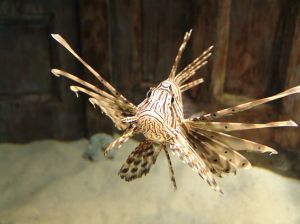Tag Archives: Reef Environmental Education Foundation
Eat a lion, save a snapper
Since the first specimens were spotted in the year 2000, the number of lionfish living off the coast of North Carolina is now so high that scientists fear it is too late to eliminate them. Instead, marine researchers are joining forces with sport divers and cooks to keep the fish population in check the old fashion way – with rice, spicy sauce and a slice of lemon.
The lionfish has a sweet meat that tastes similar to that of the appreciated food fishes like the snapper and the grouper. If you want to help save the native North Carolinian fauna by putting lionfish on as many dinner plates as possible, there are several things you can do.
For all you scuba divers, Discovery Diving Co. in Beaufort and Olympus Dive Center in Morehead City are recruiting sport divers for a series of “lionfish rodeos” that will take place during the summer dive season. The first event is planned to May 18 and 19, and new events will then be held regularly throughout the summer.
During the first lionfish rodeo, participating divers will be thought how to collect lionfish in a safe way using protective gloves. In addition to getting some lionfish off the reefs and provide all participants with a tasty meal, the rodeo will also give marine researchers a chance to study how rapidly lionfish repopulate an area after being vanquished.
In addition to divers and marine researchers, representatives of the Carteret Community College culinary school will be involved in the rodeo project. One of their main goals is to persuade restaurants in the area to start serving lionfish, so those of you that don’t dive can still help out by asking for lionfish when dining out.
“They taste good, and if we can create a food market for them maybe that will not only help keep them in control but maybe take the pressure off some other species,” sais Debby Boyce, owner of Discovery Dive Shop.
The lionfish is not a welcomed guest in North Carolina since it competes with native species for space and food and puts even more stress on already threatened fish like snappers and groupers. The lionfish seem to lack natural predators in western Atlantic waters because the lionfish population has increased at a pace unlike anything scientists have ever seen from an invasive fish species in this part of the world.
“In places off North Carolina the population density appears to be several times the norm in their native waters”, said NOAA researcher James Morris.
North Carolina is not the only state with an exploding lionfish problem on their hands; the species can now be found in large quantities all the way down into the Caribbean.
“They’re eating everything,” said Lisa A. Mitchell, executive director of Reef Environmental Education Foundation, a Florida non-profit group that is helping several Caribbean governments deal with invasive lionfish. “They could wipe out entire reefs.
The lionfish is not only a problem for native flora and fauna; it is also disliked among snorkelers and scuba divers since it is equipped with long spines capable of delivering a painful venomous sting. The venom itself it usually not lethal, but it can cause paralysis and excruciating pain – two things you definitely don’t want to suffer from while trying to get up from the deep.
In North Carolina ordinary swimmers and snorkelers rarely have to worry about lionfish since this tropical species prefer to stay in the warm waters of the Gulf Stream, i.e. miles offshore and mostly at depths of at least 100 feet. In the warmer places like the Caribbean you can on the other hand encounter lionfish in the shallows right next to the beach.
In North Carolina it is usually the scuba divers who see this fish and they are alarmed by the situation. Divers off the North Carolina coast now routinely find up to 100 lionfish during a single wreck dive.
“If you go deeper than 100 feet, they’re ubiquitous now,” said Paula Whitfield, a researcher with the National Oceanic and Atmospheric Administration (NOAA) in Beaufort. “They’re absolutely everywhere.”
Catching lionfish is labour intensive but not very difficult; all you need is a net or a spear and some protective clothing to keep yourself from being stung. The divers organized by Discovery Diving Co. in Beaufort and Olympus Dive Center in Morehead City will be fitted with the kind of puncture-proof gloves worn by workers who handle used hypodermic needles and other medical waste. Before the lionfish is cleaned and cooked it will be held down using pliers and have its venomous spines snipped off by a wire cutter.
Lionfish is not very hard to net or spear-fish since they are virtually fearless and will hold their ground even when approached by divers. Since they have so few enemies in the wild, they probably don’t see any point in fleeing. However, if we are to really eat our way out of the lionfish problem a less labour intensive method than sending down divers armed with spears and nets must naturally be developed and NOAA researchers are therefore currently working on a trap system that uses live bait.
Hopefully, we will soon see the invasive lionfish on dinner tables all the way along the western Atlantic.
